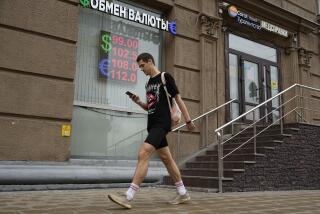Ruble’s Collapse Leaves Careers in Rubble
- Share via
MOSCOW — Rebecca Baldridge’s dream world disintegrated this summer, swiftly and stunningly.
Gone is the swish three-bedroom apartment along the Moscow River, weekends in London and dinners at exclusive restaurants without a glance at the bill.
Like thousands of other once highly paid foreigners who came to cash in on Russia’s booming financial markets, her working life came apart when the Russian economy nose-dived.
Fresh from business school at Purdue University, Baldridge had set her sights on Russia. It was 1995, the country’s fledgling financial markets were soaring, and she easily landed a Moscow stock brokerage job paying more than $100,000 a year.
“I thought, well, aren’t I just the belle of the ball. I was amazed at the response,” said Baldridge, a 31-year-old New Yorker who despite having studied Russian and holding two master’s degrees had never been to Russia and had little investment experience.
Foreigners helped drive the boom in Russia’s markets and reaped some of its biggest rewards.
And they have suffered some of the most severe, sudden losses since Russia devalued its currency and froze some of its debts in August. The ensuing meltdown has cost hundreds, perhaps thousands, of expatriates their jobs, wiped out their investments in Russia and soured many on emerging markets.
It was a heady time on Moscow’s financial scene when Baldridge debuted with Aton, a Russian brokerage. Returns were topping even optimistic expectations, and in 1997, the Russian equity market was the world’s top performer.
After a short time, Baldridge was snapped up as a senior research analyst by another medium-sized brokerage, Rinaco. The package there was even sweeter: “You could make net here what you would make gross at home.”
Moscow quickly responded as Russian and foreign executives began to get rich. Stores filled up with pricey imports, from $15 Thai curry paste to $100,000 Mercedes. Once the nexus of world communism, the Russian capital was becoming a world financial center.
The rest of Russia, however, saw little investment and growth. And the country’s deeper problems--a mounting deficit, chronic corruption and stagnant industrial production--eventually burst the Moscow bubble.
The financial markets started slumping this summer, and Baldridge lost her job in July, along with many other expatriates. Remarkably, she was soon hired by Epic, an Austrian investment bank.
“I got what I assumed to be the last job in Moscow,” she said.
Then the ruble was devalued on Aug. 17, knocking markets into a dive. Baldridge was laid off by Epic two weeks after she started.
The financial sector wasn’t the only one skewered by the crisis.
Jane and Lynn Wells left an advertising agency they had started in Colorado, uprooted their two kids and moved to Moscow this summer to work as senior managers for DMB&B; advertising.
Both were laid off within weeks.
But they haven’t given up on Russia and are searching for new jobs here. “Being in a market that was very dynamic was why we wanted to go,” Jane Wells said. “It’s not all that appealing to go back into something so safe, secure and predictable.”
While Russians were hoarding food, Baldridge was packing papers into duffel bags in preparation for moving to New York. “I don’t really want to go, but there’s nothing for a finance person to do here,” she said.
Like many foreigners in Moscow, Baldridge also had personal investments in Russia’s markets. She said her losses weren’t too large, but some lost hundreds of thousands of dollars.
“I’m going to see a significant decline in my standard of living,” she said. “I certainly won’t be as profligate.”
And she still needs a job. “Three years ago my interest in Russia made me immensely popular,” she said. Now, “I’m hoping Russia hasn’t given me professional cooties.”
More to Read
Inside the business of entertainment
The Wide Shot brings you news, analysis and insights on everything from streaming wars to production — and what it all means for the future.
You may occasionally receive promotional content from the Los Angeles Times.










